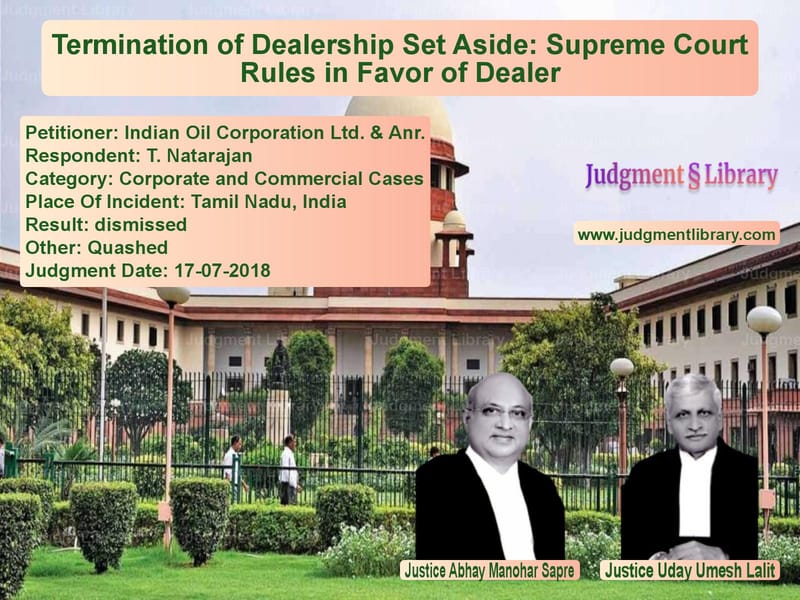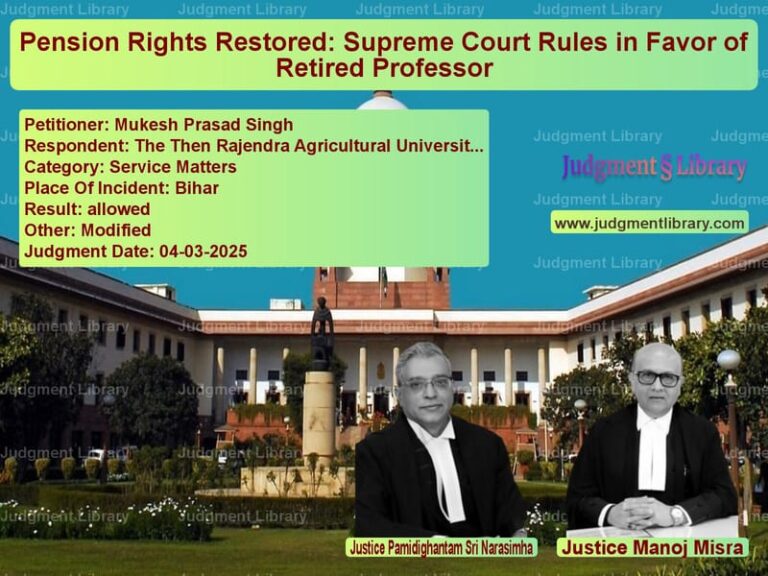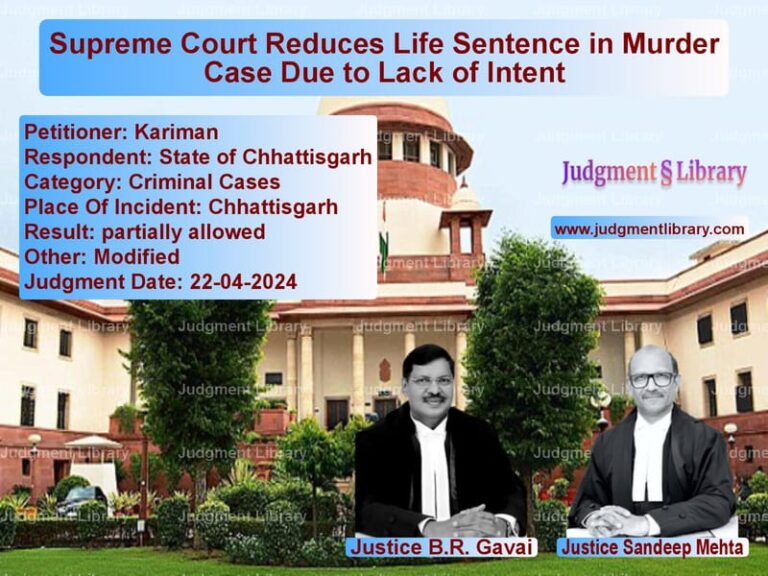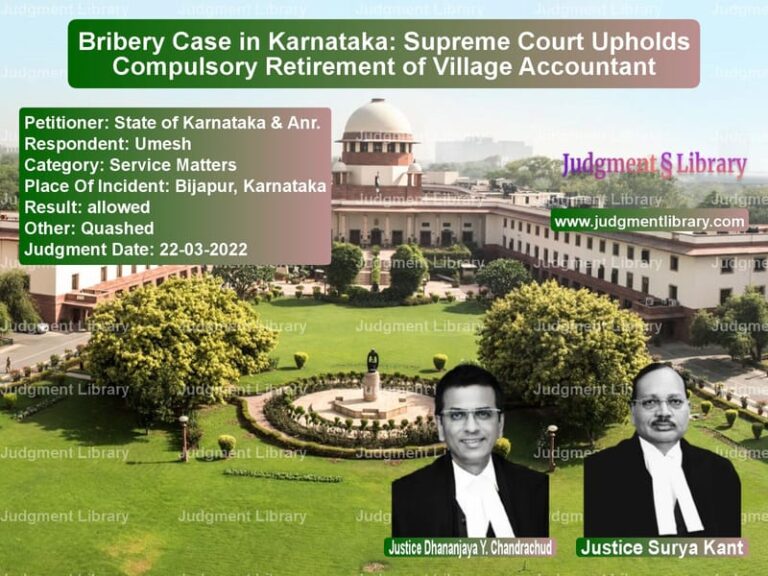Termination of Dealership Set Aside: Supreme Court Rules in Favor of Dealer
The case of Indian Oil Corporation Ltd. & Anr. v. T. Natarajan pertains to the termination of a dealership agreement between Indian Oil Corporation (IOC) and its retail dealer, T. Natarajan. The Supreme Court was called upon to decide whether the dealership termination was justified and whether the Division Bench of the High Court was correct in reinstating the dealer’s rights. The ruling reinforces the principles of fair contract enforcement and administrative accountability.
Background of the Case
Indian Oil Corporation Ltd. (IOC), a government-owned petroleum company, entered into a dealership agreement with T. Natarajan in 1989 for the sale of petroleum products. The respondent operated a fuel station under the name M/s Lakshmi Service Station in Tamil Nadu.
On August 1, 2008, an inspection was conducted at the respondent’s petrol pump by the Deputy Inspector of Labour (Weights & Measures), followed by another inspection on August 2, 2008 by an IOC Sales Officer. During these inspections, it was found that the totalizer wires of the L&T Line DU petrol pump had been cut, and the totalizer seal was missing. This raised concerns of manipulation of fuel dispensing.
Based on these findings, IOC issued a show-cause notice to the respondent on August 27, 2008, asking why his dealership should not be terminated. Dissatisfied with his response, IOC terminated his dealership agreement on March 11, 2009.
Arguments by the Parties
Petitioner’s (Indian Oil Corporation Ltd.) Arguments
- The dealership agreement provided strict conditions regarding adherence to the integrity of fuel dispensing equipment.
- The respondent was found in violation of these terms when the totalizer seal was found missing, suggesting potential fraud.
- The termination was in accordance with the dealership agreement and within IOC’s rights as per contractual provisions.
- The Arbitrator and Single Judge of the High Court upheld the termination, and the Division Bench erred in reinstating the dealership.
Respondent’s (T. Natarajan) Arguments
- The inspection reports did not establish any variation in the quality or quantity of fuel dispensed.
- There was no evidence of malpractices such as short-selling or adulteration.
- The dealership termination was an extreme measure and caused substantial financial loss.
- The Arbitrator had acknowledged that no wrongdoing was conclusively proven and recommended leniency.
Legal Issues Considered by the Supreme Court
The Supreme Court examined several key legal aspects:
- Whether the removal of the totalizer seal justified the dealership termination.
- The extent of IOC’s discretionary power under the dealership agreement.
- The findings of the Arbitrator, which acknowledged the dealer’s hardships and recommended leniency.
- Whether the High Court’s Division Bench was justified in reinstating the dealership.
Supreme Court’s Observations
The Supreme Court critically analyzed the case and made the following observations:
- The inspections did not establish any fraudulent activity such as short-selling or adulteration.
- The dealership agreement required strict compliance, but the punishment of termination appeared disproportionate.
- The Arbitrator had noted that while the missing seal was a violation, there was no financial loss or evidence of fraud.
- The Division Bench correctly ruled that the dealership should be reinstated, considering the prolonged closure of the respondent’s fuel station.
Final Judgment
The Supreme Court dismissed IOC’s appeal and upheld the Division Bench’s order reinstating the dealership. The Court issued the following directives:
- IOC must immediately resume the supply of fuel to the respondent’s service station.
- The dealership must be restored without further delay.
- Any pending financial dues related to the suspension period must be settled fairly.
The Supreme Court emphasized that contract enforcement should be fair and that terminations must not be arbitrary or disproportionate. This ruling ensures that commercial agreements, particularly those involving state-owned enterprises, must be executed in a manner that considers both contractual terms and proportionality in disciplinary actions.
Petitioner Name: Indian Oil Corporation Ltd. & Anr..Respondent Name: T. Natarajan.Judgment By: Justice Abhay Manohar Sapre, Justice Uday Umesh Lalit.Place Of Incident: Tamil Nadu, India.Judgment Date: 17-07-2018.
Don’t miss out on the full details! Download the complete judgment in PDF format below and gain valuable insights instantly!
Download Judgment: Indian Oil Corporati vs T. Natarajan Supreme Court of India Judgment Dated 17-07-2018.pdf
Direct Downlaod Judgment: Direct downlaod this Judgment
See all petitions in Contract Disputes
See all petitions in Corporate Governance
See all petitions in unfair trade practices
See all petitions in Judgment by Abhay Manohar Sapre
See all petitions in Judgment by Uday Umesh Lalit
See all petitions in dismissed
See all petitions in Quashed
See all petitions in supreme court of India judgments July 2018
See all petitions in 2018 judgments
See all posts in Corporate and Commercial Cases Category
See all allowed petitions in Corporate and Commercial Cases Category
See all Dismissed petitions in Corporate and Commercial Cases Category
See all partially allowed petitions in Corporate and Commercial Cases Category







